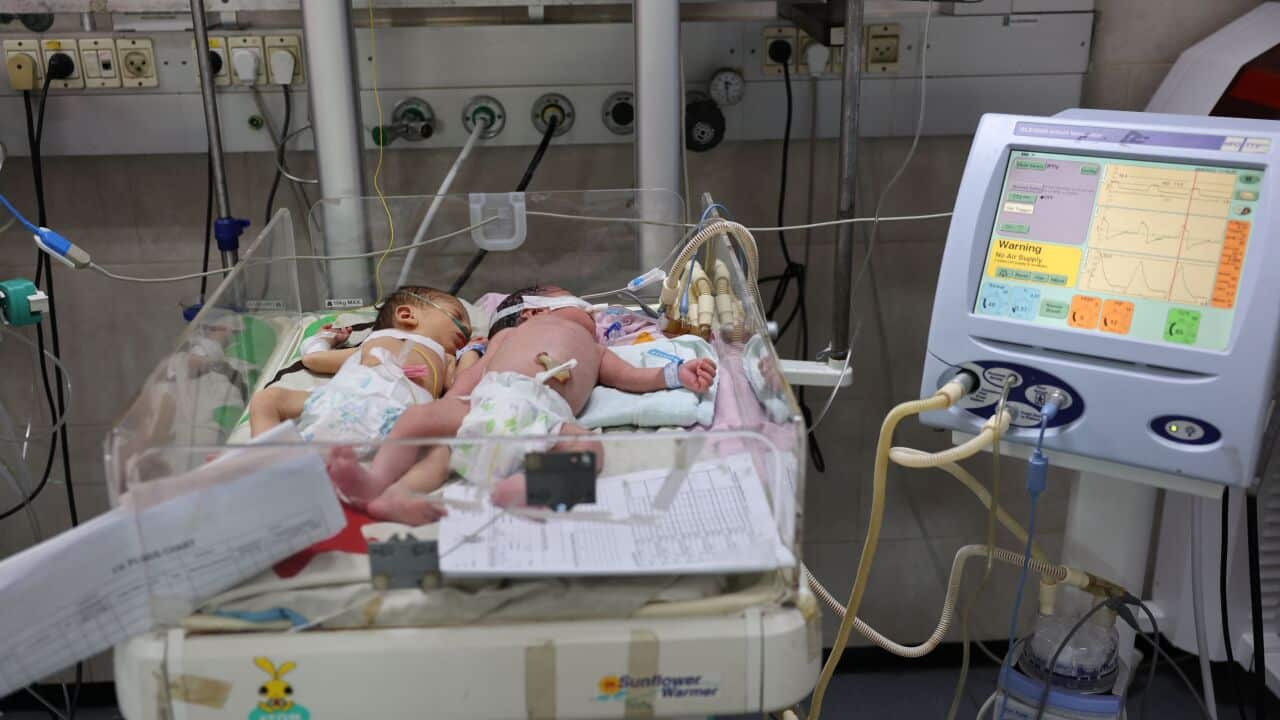Key Points
- Gaza health ministry officials said 130 newborn babies are relying on electric incubators across the Gaza Strip.
- A third aid convoy entered the Rafah crossing, but with fewer trucks than the 100 per day UN officials say are needed.
- The UN humanitarian office said about 1.4 million of Gaza's 2.3 million population were now internally displaced.
Doctors at a Gaza neonatal intensive care unit are scrambling to find fuel and basic medicines for their tiny patients who could die within minutes if their incubators lose power in the Palestinian enclave under Israeli siege.
"We call on everyone to send the necessary medical supplies for this critical department or else we face a huge catastrophe," said Dr Nasser Bulbul at Al-Shifa Hospital in Gaza City.
"If the electricity is out, in these departments, where there are 55 babies, we will lose all those who need electricity within five minutes."
Ashraf al-Qidra, spokesperson for the Gaza health ministry, said there were 130 newborn babies in electric incubators across the Gaza Strip.
Qidra said generators at hospitals — and especially at al-Shifa hospital, the largest of Gaza's 13 public hospitals — were running out of fuel and "just at the bottom of tankers".
"We have switched the fuel to the most essential life-saving services, including the incubators, but we don't know how long this will last," he said.
"We are appealing for the whole world to help with fuel. We have even asked our public and private petrol stations to donate whatever they can save of fuel to help save lives in hospitals."

A newborn infant receives care inside an incubator at a neonatal intensive care unit (NICU) at al-Shifa Hospital in Gaza City. Source: Getty / Mohammed Abed
The tiny Palestinian enclave, one of the most crowded places in the world, is running out of water, food, medicines and fuel for its 2.3 million people and Gaza's medics have been scrambling to keep hospitals functioning.
A third aid convoy entered the Rafah crossing from Egypt on Monday bound for Gaza, but with far fewer trucks than the 100 per day that UN officials say are needed to meet essential needs.
Doctors at al-Shifa hospital say they are waiting for relatives to come forward and name a baby whose mother Fatima Al-Hersh's house was bombed. They said they saved the baby but not the mother or the rest of her 11-member family.
The physician treating the baby said on Facebook: "When the baby gets better we don't know who is going to take care of him after he became an orphan."
Gaza authorities say at least 5,087 Palestinians have been killed in Israeli air strikes since 7 October, including 2,055 children, and more than 15,000 people have been wounded.

Smoke rises following an Israeli airstrike in the Gaza Strip, as seen from southern Israel, Monday, Oct. 23, 2023. Source: AP / Francisco Seco
The Israeli military has been encouraging Palestinians to head to the southern Gaza Strip because it is safer, but hospitals say they cannot move the sick and wounded, especially those on life-saving equipment. And air strikes have hit across the Gaza Strip.
An Israeli military spokesperson said: "The IDF (Israel Defence Forces) has been encouraging residents of the northern Gaza Strip to move southward and not to stay in the vicinity of Hamas terror targets within Gaza City.
"But, ultimately, Hamas has entrenched itself among the civilian population throughout the Gaza Strip. So wherever a Hamas target arises, the IDF will strike at it in order to thwart the terrorist capabilities of the group, while taking feasible precautions to mitigate the harm to uninvolved civilians."
is the latest boiling point in a long-standing conflict between Israel and Hamas.
Hamas is a Palestinian military and political group, gaining power in the Gaza Strip since winning legislative elections there in 2006.
Hamas’s stated aim is to establish a Palestinian state, while refusing to recognise Israel’s right to exist.










